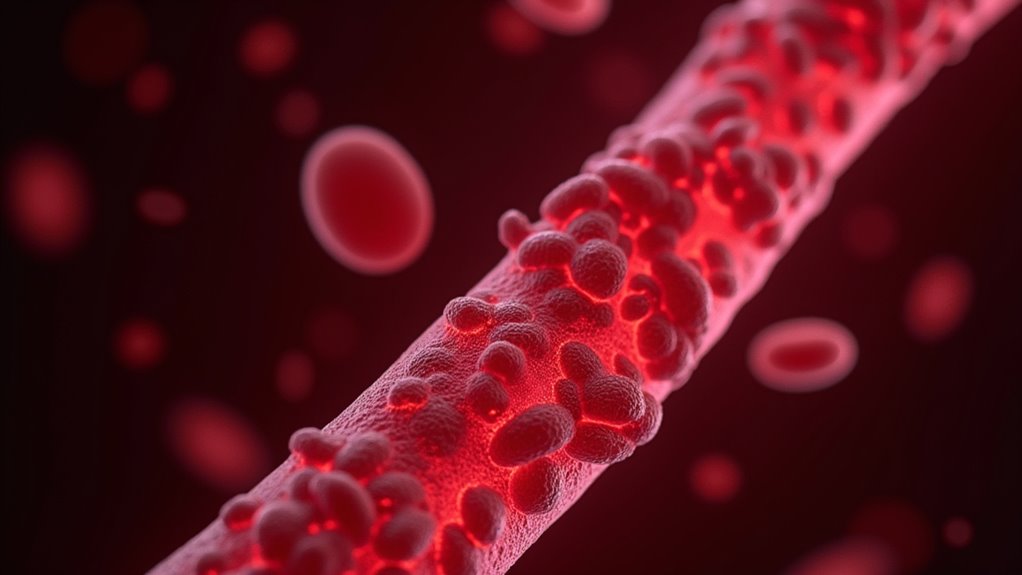Alcohol rapidly crosses your blood-brain barrier, disrupting neural pathways and impairing coordination, judgment, and reaction time. It strains your cardiovascular system, raising blood pressure and weakening heart muscle efficiency. Your liver metabolizes 90% of consumed alcohol, potentially leading to inflammation and scarring. You’ll experience digestive issues, poor sleep quality, and compromised athletic performance. These effects represent just the beginning of alcohol’s complex impact on your body’s systems.
Key Takeaways
- Alcohol impairs brain function, affecting coordination, judgment, and reaction time while causing slurred speech and vision problems.
- Regular drinking strains the heart, raising blood pressure and increasing the risk of cardiovascular diseases and irregular heartbeats.
- Heavy alcohol use damages the liver, causing inflammation and potentially leading to conditions like fatty liver disease and cirrhosis.
- Alcohol disrupts digestive health by irritating the stomach, reducing nutrient absorption, and causing inflammation of the pancreas.
- Alcohol interferes with muscle recovery, reduces training effectiveness, and compromises overall physical fitness goals.
Immediate Effects on Brain Function and Coordination

When alcohol enters your bloodstream, it quickly crosses the blood-brain barrier and begins interfering with neural communication pathways. As alcohol levels rise, you’ll experience progressive cognitive impairment affecting judgment, decision-making, and reaction time. Your cerebellum, responsible for balance and coordination, becomes particularly vulnerable to alcohol’s effects.
You’ll notice a decline in motor skills as alcohol disrupts the communication between your brain and muscles. Simple tasks like walking straight or catching objects become increasingly difficult. Your speech may slur, and your eye movements become less precise, leading to blurred or double vision. These impairments occur because alcohol slows down the transmission of signals between neurons, affecting both your central and peripheral nervous systems. The severity of these effects directly correlates with your blood alcohol concentration.
Impact on Heart Health and Blood Pressure

Although moderate alcohol consumption may temporarily dilate blood vessels, regular drinking can greatly impact your cardiovascular system. Your heart must work harder to pump blood throughout your body when you drink regularly, leading to increased blood pressure and heightened cardiovascular risks.
| Effect | Impact |
|---|---|
| Blood Pressure | Raises systolic and diastolic readings |
| Heart Muscle | Can weaken and stretch cardiac tissue |
| Arrhythmia | Increases risk of irregular heartbeat |
| Blood Flow | Reduces circulation efficiency |
You’ll experience more strain on your heart with sustained alcohol consumption, potentially leading to cardiomyopathy. This condition weakens your heart muscle, making it harder to pump blood effectively. Heavy drinking can also contribute to atherosclerosis, where arteries become narrow and less flexible, increasing your risk of heart attack and stroke.
Liver Function and Long-Term Damage

Since your liver metabolizes roughly 90% of consumed alcohol, chronic drinking puts tremendous stress on this essential organ. During alcohol metabolism, your liver produces toxic compounds that can trigger inflammation and scarring of liver tissue, potentially disrupting its natural regeneration process.
Regular excessive drinking can lead to:
- Fatty liver disease, where fat accumulates in liver cells
- Alcoholic hepatitis, characterized by severe inflammation
- Cirrhosis, involving permanent scarring that impairs liver function
Your liver’s remarkable ability for liver regeneration becomes compromised when exposed to prolonged alcohol abuse. The organ gradually loses its capacity to break down toxins, process nutrients, and regulate blood sugar levels. This deterioration often progresses silently until significant damage has occurred, making early intervention essential for preventing irreversible harm to this critical organ.
Changes in Digestive System Performance
Because alcohol directly irritates the digestive tract’s lining, regular drinking can trigger significant changes in your gastrointestinal function. Your stomach’s acid production increases, which can lead to inflammation and ulcers. During alcohol metabolism, your digestive system’s ability to break down and absorb essential nutrients becomes impaired.
You’ll also experience changes in your intestinal motility, often resulting in diarrhea or constipation. The damage to your intestinal walls can make them more permeable, allowing harmful substances to enter your bloodstream. This heightened permeability contributes to a range of digestive disorders, including inflammatory bowel conditions and bacterial overgrowth.
Additionally, your pancreas may become inflamed, disrupting its ability to produce vital digestive enzymes. These combined effects can lead to chronic malnutrition, even if you’re maintaining regular food intake.
Effects on Sleep Quality and Patterns
While your digestive system processes alcohol, your brain experiences considerable disruptions to its sleep-wake cycle. Your primary drowsiness from alcohol consumption leads to fragmented sleep patterns and reduced sleep quality throughout the night.
- Alcohol suppresses REM sleep during the initial half of your night, preventing proper memory consolidation and emotional processing
- As alcohol metabolizes, you’ll experience frequent awakenings and sleep disturbances during the second half of your sleep cycle
- During alcohol withdrawal, your sleep architecture becomes severely disrupted, leading to insomnia and vivid dreams
These sleep disruptions can persist even after you’ve stopped drinking, as your brain attempts to reestablish its natural sleep rhythm. Research indicates that chronic alcohol use considerably alters your circadian timing system, potentially leading to long-term sleep disorders and daytime fatigue.
Immune System Response and Vulnerability
Although alcohol initially creates a sense of warmth and relaxation, it greatly compromises your body’s immune defenses. When you drink, your immune response weakens, making you more susceptible to infections and diseases. Your white blood cells become less effective at fighting off pathogens, and your body’s inflammatory responses become dysregulated.
Regular alcohol consumption can lower your alcohol tolerance while simultaneously reducing your immune system’s ability to produce antibodies. You’ll become more vulnerable to respiratory infections, pneumonia, and other bacterial or viral illnesses. Research shows that heavy drinkers are particularly susceptible to tuberculosis and face increased risks of post-surgery complications. Even moderate drinking can delay wound healing and impair your body’s natural recovery processes, as your immune system struggles to maintain its defensive capabilities.
Nutritional Deficiencies and Metabolism Changes
When alcohol interferes with your body’s metabolic processes, it disrupts the absorption and utilization of essential nutrients. Your liver prioritizes breaking down alcohol over maintaining proper nutrient absorption, leading to considerable metabolic changes and potential deficiencies.
- Your metabolic rate temporarily increases as your body works to eliminate alcohol, causing irregular energy expenditure and potential blood sugar fluctuations
- You’ll experience reduced absorption of crucial nutrients like thiamine, folate, and vitamin B12, which can lead to serious health complications if drinking becomes chronic
- Your body’s ability to metabolize proteins and fats becomes compromised, affecting muscle maintenance and general tissue health
These metabolic disruptions can persist long after you’ve stopped drinking, potentially causing lasting effects on your body’s nutritional status and cellular function. Regular alcohol consumption markedly impacts your body’s ability to maintain proper nutritional balance.
Physical Fitness and Athletic Performance
Since alcohol greatly impairs athletic capabilities, both immediate and regular consumption can diminish your physical performance across multiple domains. When you drink, your body’s ability to synthesize protein decreases, which directly interferes with muscle recovery after exercise. You’ll also experience reduced testosterone levels, limiting your capacity to build and maintain lean muscle mass.
Alcohol’s dehydrating effects greatly impact your endurance training by decreasing your body’s ability to regulate temperature and maintain proper cardiovascular function. You’ll notice decreased aerobic capacity, slower reaction times, and impaired balance. Research shows that drinking can disrupt your sleep patterns, leading to suboptimal recovery between training sessions. Even moderate alcohol consumption can negate the benefits of your workout routine by interfering with cellular repair processes and glycogen replenishment in your muscles.
Frequently Asked Questions
Does Alcohol Affect Fertility and Reproductive Health in Men and Women?
Yes, alcohol considerably impacts your fertility and reproductive health. In women, it disrupts reproductive hormones, affecting ovulation and menstrual cycles. You’ll face increased risks of miscarriage and decreased pregnancy success rates. For men, alcohol reduces testosterone levels, impairs sperm production, and alters sperm quality. If you’re trying to conceive, heavy drinking can lead to fertility issues in both partners, making it harder to achieve pregnancy.
Can Drinking Alcohol Change Your Skin’s Appearance Over Time?
Regular alcohol consumption greatly impacts your skin’s appearance. It disrupts skin hydration by acting as a diuretic, leaving your complexion dry and dull. The dehydrating effects also make fine lines and wrinkles more noticeable. Alcohol causes blood vessels to dilate, leading to facial redness and broken capillaries. Moreover, it depletes essential nutrients and increases inflammation, contributing to premature aging through reduced collagen production and compromised skin barrier function.
How Does Alcohol Consumption Impact Bone Density and Healing?
When you regularly consume alcohol, it disrupts your bone health through multiple mechanisms. Your body’s alcohol metabolism interferes with calcium absorption and vitamin D processing, both essential for maintaining strong bones. Heavy drinking also reduces bone density by suppressing new bone formation and increasing bone breakdown. If you suffer a fracture, alcohol can slow your healing process by impairing blood flow and disrupting the normal inflammatory response needed for recovery.
Does Mixing Different Types of Alcohol Make Hangovers Worse?
Contrary to popular belief, mixing different types of alcohol doesn’t inherently make your hangover worse. The severity of your hangover primarily depends on the total amount of alcohol you consume, not the variety. What matters is the ethanol content and how quickly you’re drinking. However, mixing alcohol types might lead you to lose track of your total consumption, which can result in drinking more than intended, causing worse hangovers.
Can Alcohol Affect Vision and Eye Health in the Long Term?
Long-term alcohol consumption can considerably impact your eye health and vision. You’ll face an increased risk of vision impairment through several mechanisms. Heavy drinking can damage your optic nerve, leading to decreased color perception and reduced peripheral vision. You’re also more likely to develop serious eye diseases, including cataracts and mature-related macular degeneration. Furthermore, alcohol interferes with your eyes’ ability to adjust to light and dark conditions.





